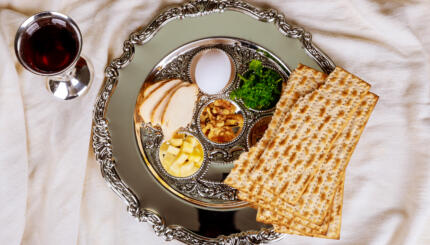This parashah quiz is provided by special arrangement with the Pardes Institute of Jewish Studies. To learn more, visit www.pardes.org.il.
Questions
1. After Shabbat Hol Hamoed is over, do we recite the counting of the Omer before or after Havdalah?
2. At the Seder, how many times do we wash our hands?
3. Describe in detail what the Bible legislates should happen on the 10th of Nisan.
With your help, My Jewish Learning can provide endless opportunities for learning, connection and discovery.
4. What was done with the lamb or goat that was selected on the 10th?
5. There are only two positive mitzvot whose punishment–should one fail to observe them–is spiritual excision from the Jewish people. What are these mitzvot?
6. By what time must the seder meal be completed?
7. Hametz is the Hebrew technical term for a leavened product derived from any one of five basic types of food grain. What are these five grains?
8. In addition to the five grains mentioned above, Ashkenazic Jews also do not eat five other foods or their derivatives. What are they?
9. Although women are generally not obliged to fulfill positive time-bound commandments according to traditional halakhah, on seder night they are required to drink the four cups of wine. Why?
10. In the six week period preceding Passover, there are five special Shabbatot which more or less serve as a countdown to Passover. What are they?
11. Matzah is often described as the bread of what?
Answers
1. We count the Omer before Havdalah.
2. We wash our hands three times during the seder.
3. On the 10th of Nisan, every household was to designate a lamb, for the Paschal offering. If the household was too small to consume the whole lamb before morning, they should go in with a neighbor (Ex. 12:2-4).
4. It was kept until the 14th and then killed at dusk (Ex. 12:6).
5. Failure to eat matzah at the Seder and failure to have a brit milah (circumcision) warrant spiritual excision.
6. The seder meal must be completed by 38 minutes after midnight.
7. The five types of grain are wheat, oats, barley, spelt, and rye.
8. Ashkenazic Jews also don’t eat rice, corn, peanuts, peas, and beans.
9. Women are included in the mitzvah to drink four cups of wine because of the tradition that states that “because of the actions of righteous women, we were delivered from Egypt.”
10. The five special shabbatot are: Shabbat Shekalim, Shabbat Zakhor, Shabbat Parah, Shabbat Hahodesh, Shabbat Hagadol.
11. Matzah has been described as both the bread of affliction, and the bread of freedom.
mitzvah
Pronounced: MITZ-vuh or meetz-VAH, Origin: Hebrew, commandment, also used to mean good deed.
seder
Pronounced: SAY-der, Origin: Hebrew, literally "order"; usually used to describe the ceremonial meal and telling of the Passover story on the first two nights of Passover. (In Israel, Jews have a seder only on the first night of Passover.)
Shabbat
Pronounced: shuh-BAHT or shah-BAHT, Origin: Hebrew, the Sabbath, from sundown Friday to sundown Saturday.


